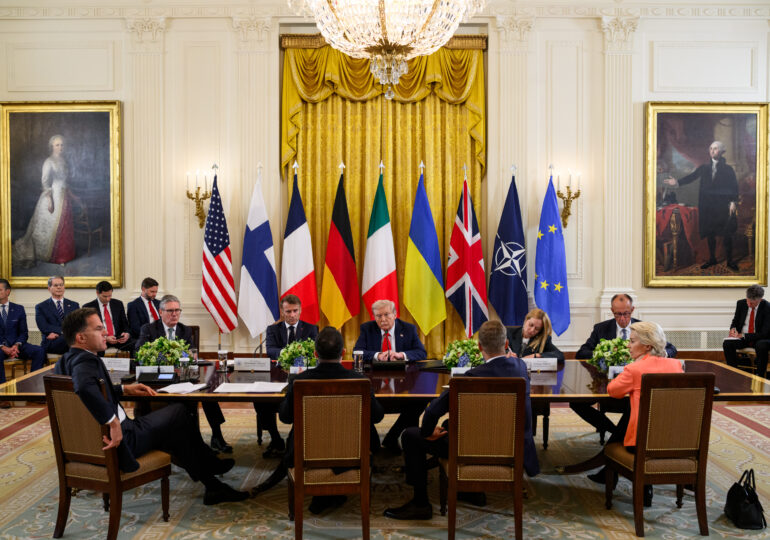The Monday meeting at the White House, which brought together US President Donald Trump, Ukrainian President Volodymyr Zelensky, and several European leaders including British Prime Minister Keir Starmer and French President Emmanuel Macron, was intense from a diplomatic perspective but lacked clear commitments.
However, essential topics were addressed that could decisively influence the course of the conflict in Ukraine in the near future. Here are 4 key elements that stood out after the summit and the participants' statements.
1. Security guarantees: promises without concrete details
One of the most important themes of the discussion was providing security guarantees to Ukraine. Donald Trump stated that the US would participate in this mechanism but avoided saying whether this would entail American military presence on Ukrainian territory. "We will be involved. We will offer them solid protection," he said, as quoted by Sky News.
European leaders supported the initiative. European Commission President Ursula von der Leyen appreciated the openness to "guarantees similar to Article 5 of NATO," while Emmanuel Macron emphasized the importance of Ukraine being able to build a robust army "for the years and decades to come."
Zelensky confirmed that the discussions included a potential $90 billion military agreement covering anti-aircraft defense systems, aviation equipment, and other weapons "that cannot yet be disclosed."
2. Trump–Putin–Zelensky Summit: real or just a smokescreen?
Donald Trump stated that he had already spoken on the phone with Vladimir Putin and was beginning to plan a direct meeting between the Russian leader and Zelensky. Subsequently, a trilateral meeting would follow, with the American president personally participating.
The Kremlin confirmed that the phone discussion lasted 40 minutes, but advisor Yuri Ushakov only offered a vague formulation: "It is useful to explore the possibility of raising the level of delegations."
Zelensky expressed willingness to participate in such a meeting, although in the past, he suggested that Putin was not genuinely interested in real negotiations. This proposal is viewed skeptically in Kyiv, where it is known that Moscow has repeatedly rejected the idea of a direct meeting.
An open microphone caught a glimpse of Trump's personal style behind closed doors. Speaking with Emmanuel Macron, the American president said, "I think he wants to make a deal. For me. I know it sounds crazy, but I believe that," referring to Putin.
3. Peace negotiations without a ceasefire? Trump says yes, Europeans say no
Trump put forth a risky idea: a peace agreement could be negotiated without a prior ceasefire. "All six agreements we made this year were during conflicts. None of them needed a ceasefire," he stated. In his view, a ceasefire could allow one of the parties to regroup militarily.
The reaction from European leaders was swift. German Chancellor Friedrich Merz, quoted by BBC, firmly stated, "I cannot imagine a next meeting without a ceasefire." Macron expressed a similar position, advocating for "diplomatic pressure on Russia."
Surprisingly, Zelensky did not reiterate his traditional request for a ceasefire, indicating a desire not to escalate tensions at the White House.
4. Territories in exchange: a proposal that disturbs the peace
Perhaps the most controversial statement by Trump was about "discussions on territorial exchanges," taking into account the current contact line. The idea comes after Putin reportedly requested recognition of the annexation of the Donetsk and Luhansk regions at the Alaska summit, in exchange for withdrawing from other occupied territories.
It is a red line for Zelensky, who categorically rejected any territorial compromise. However, the fact that the subject was mentioned and not publicly rejected by participants indicates that behind closed doors, such scenarios are at least being considered.
After the meeting, though, Emmanuel Macron stated that the issue of potential territorial concessions by Ukraine was not addressed in the White House discussions. "We did not discuss this issue at all today," claimed the French president in front of journalists. "And that for two reasons. First, the priority is security guarantees, and secondly, it was said that this should be discussed at a bilateral and trilateral level," he explained.
Bonus. Zelensky and the charm offensive in diplomacy
And one more element caught attention.
Aware of the tensions from his previous visit to Washington, the Ukrainian president adopted a much more cautious approach to his image. Ditching the military t-shirt in favor of a somber suit, Zelensky was "on a charm offensive" - as noted by BBC.
He thanked six times in the first minutes of the meeting and personally handed Trump a letter from his wife addressed to Melania Trump: "It's not for you. It's for your wife," he said with a smile.
It was a clear contrast to his visit in February when he was criticized by Vice President JD Vance for "lack of gratitude" for American assistance. Now, Zelensky seemed determined to regain his allies without appearing weak.
Conclusion
The White House meeting produced smiles, applause, and optimistic headlines, but few firm commitments.
Security guarantees, negotiation format, conditions for peace, and Ukraine's territorial integrity remain critical points.
Whether Trump succeeds in convincing both the Kremlin and European allies remains to be seen. For now, Ukraine has gained a diplomatic breather and a chance to keep its cause at the center of the international agenda.

